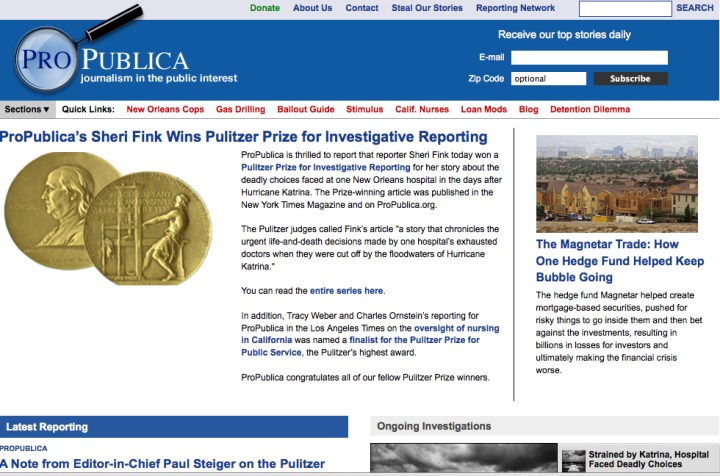Media
Online’s Bar-Mitzvah: A Pulitzer Prize for Investigative Journalism

If online journalism were Jewish and male, it would be a man today. Of course, most thirteen-year-old Bar-Mitzvah boys are very far from men when they read from the Torah, and they probably won’t be for another five years or more (maybe ten, depending on when they move out of their mother’s house), but that doesn’t apply to news on the Internet – because, when you win a Pulitzer Prize, you achieve adulthood instantly.
The accolade couldn’t have come from a more respected source. The Pulitzer Prize, founded in 1917 on the instructions set out in the will of newspaper publisher Joseph Pulitzer, has for the first time been awarded to an online publication. That’s right, a Web-based non-profit entity that markets itself by working closely with traditional news outlets has been named the joint winner of the 2010 Pulitzer Prize for Investigative Journalism. Why does it matter? Why’s The Daily Maverick so excited? For a whole bunch of reasons, mainly to do with phrases such as “online’s coming of age,” but more specifically because even people like Ernest Hemingway, Norman Mailer, Toni Morrison and Saul Bellow couldn’t (and, in the case of Morrison, still can’t) refrain from calling themselves Pulitzer Prize-winners in their book bios. It’s an honour that admits you and your kind to an elite club; to have one is to have arrived.
ProPublica is the name of the entity that, as of yesterday, brought some long-overdue esteem to online news publications the world over. The Huffington Post talked up the raised stature of the medium with the headline, “Old and New Media Pulitzer Winners Highlight Changing Face of Journalism”. Mashable led with “Online Journalists Make Pulitzer History”. Dozens more, basking in the reflected glory, gushed heartily over their Internet-spawned cousin.
Of course, ProPublica does differ from the vast majority of online news outlets in one important respect: its model, which focuses exclusively on hard-hitting investigative reporting, and which is funded by philanthropic contributions from large foundations. Given that it has a newsroom of 32 investigative reporters, all working full-time on stories of major US national importance, it can’t very well sustain itself by advertising – but still, ProPublica is a response to the crisis in media, not a victim of it.
As ProPublica notes on its website: “Investigative journalism is at risk. Many news organisations have increasingly come to see it as a luxury. Today’s investigative reporters lack resources: Time and budget constraints are curbing the ability of journalists not specifically designated ‘investigative’ to do this kind of reporting in addition to their regular beats. This is therefore a moment when new models are necessary to carry forward some of the great work of journalism in the public interest that is such an integral part of self-government, and thus an important bulwark of our democracy.”
The Pulitzer Prize was won by ProPublica’s Sheri Fink, for an article published on the website and in the New York Times Magazine in August 2009. The 13,000-word story, titled “The Deadly Choices at Memorial,” revealed that doctors at a New Orleans hospital gave lethal injections to bedridden and critically-ill patients as the floodwaters of Hurricane Katrina rose. The press release put out on Monday by the Pulitzer board said that the entry had been moved from the Feature Writing category. The release also noted that Fink beat reporters of the Sarasota Herald-Tribune who unraveled $10billion in suspicious Florida real estate transactions.
More in keeping with the tradition of the Pulitzers, the Washington Post bagged four awards and the New York Times three. David Hoffman’s book The Dead Hand won for non-fiction, and TJ Stiles’s The First Tycoon, about Cornelius Vanderbilt, won for biography.
By Kevin Bloom
Read more: ProPublica, The Huffington Post, Mashable, New Yorker


















 Become an Insider
Become an Insider